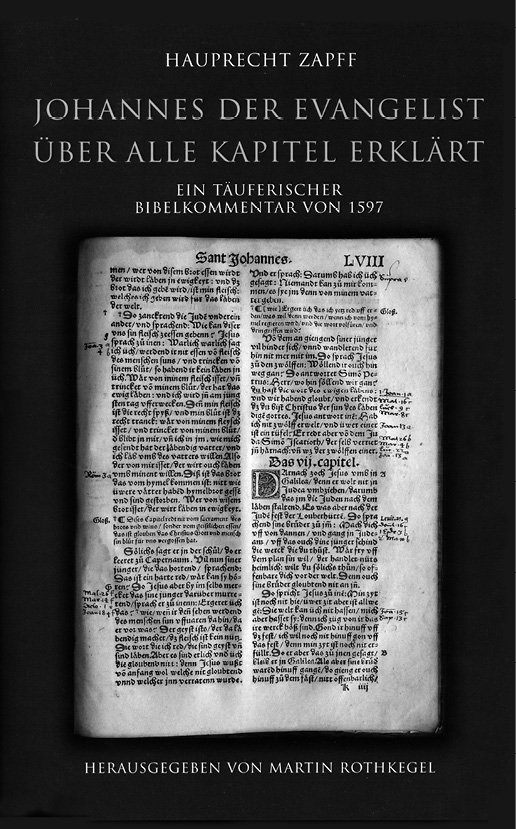Review: Johannes der Evangelist über alle Kapitel erklärt
Johannes der Evangelist über alle Kapitel erklärt: Ein Täuferischer Bibelkommentar von 1597
By Hauprecht Zapff
Edited by Martin Rothkegel
MacGregor, Manitoba: Hutterian Brethren Book Centre, 2017, pp. 446. Hardcover
Reviewed by Titus Guenther

Sermons in Hutterian communities were traditionally based on an extensive Corpus of sixteenth- and seventeenth-century works of Bible interpretations by their leaders (iii). The manuscript that forms the core of Johannes der Evangelist by Hauprecht Zapff (now added to this Corpus) was discovered in the Library of the Brunkenthal Museum in Hermannstadt (Sibiu, Romania).
The publication of this meticulous, verse-by-verse Commentary on the Gospel of John by Hauprecht Zapff (1546–1630), Hutterian preacher and Bible scholar (vii), is clearly a special addition to the previously published biblical teachings from this Anabaptist branch of the church. Other writings by Zapff include several sermons, a comprehensive Commentary on the Gospel of Luke, a Little Handbook for catechesis, as well as five hymns for his Hutterite faith family (viii).
Zapff’s work falls within the latter part of the “golden era” of Hutterian theological and biblical writings. According to the foreword, the Hutterites continue “to draw on the literary legacy of their forebears from the sixteenth century: Peter Riedemann’s Rechenschaft, the Great History Book, the “Ancestral Hymns,” the Great Book of Articles, as well as numerous Confessions, Letters, and Documents all originated in this foundational century” (i)—now expanded by Zapff’s Johanneskommentar, unearthed by Martin Rothkegel.
In view of Zapff’s historical timeframe, readers may expect him to show a strong convergence in methodology with his predecessors. However, while sharing some traits with teachers, he also diverges from them. Rothkegel, church historian and editor of this commentary on John, demonstrates that Zapff does not follow the “paraphrasing” method so central to Riedemann and others in their biblical interpretation—Riedemann, e.g., produced “paraphrases” of each Synoptic Gospel and fragments of paraphrases on John’s Gospel.
By contrast, Zapff offers an “expository commentary” (Expositionskommentar). That is, exegesis for Zapff is not a running “transcription” of the biblical text but an interpretive commentary clearly distinct from and longer than the actual Bible verse(s) being interpreted (x). Specifically, this manuscript of Zapff’s Täuferischer Bibelkommentar on John uses the text of the 1524 German New Testament, published in Zürich (xi). In Rothkegel’s edition of the commentary, the Bible verses are helpfully set apart in bold print while Zapff’s exposition appears separately in light print.
Since Zapff eschewed university education (cf. 331, et al.), his exposition, accordingly, shows no evidence of him using Greek or Latin biblical texts. While he does not extensively following the paraphrasing method, he does subscribe to the “Reformation principle that Scripture interprets itself” (xi). Thus, Zapff adduces a great many parallel Scripture verses from both Old and New Testaments in order to elucidate the particular words of a given text. Rothkegel notes a “three-step” method to the work of Zapff: “explanation of the plain sense of the words, revelation of the hidden spiritual meaning (through use of allegory or typology) and practical application for the Hutterite congregation” (xif). What distinguishes Zapff most from Riedemann and contemporaries is the importance he assigns to the “literal or historical” meaning of the biblical text (xii).
Zapff does subscribe to the allegorizing and typological method. Rothkegel explains that typology allows Zapff to interpret, for instance, all issues mentioned in John’s Gospel referring to the Mosaic Law, Israel’s worship practices and the Land of Palestine as pointing to Jesus Christ and the salvation wrought by him. Furthermore, Zapff sees Christ’s teaching as pointing to the Hutterian church and its proclamation and ordinances (xii).
The Christology at the centre of Zapff’s Johannes der Evangelist, is interesting. Unlike the Polish “anti-trinitarian” Anabaptist Brethren, and unlike the Melchiorite Anabaptist doctrine of incarnation—though these groups are not directly named—Zapff defends “the pre-existence and divinity of Christ and his essential oneness with the Father” (John 1:1ff. and throughout) (xii). Another pervasive theme in this Johanneskommentar is that of the “new birth,” wrought solely by the Holy Spirit; only those “born again,” followed by the outward sign of baptism, are enabled for true discipleship, practiced within the Hutterian communion and its ordinances (xiif.).
In order to make Zapff’s pre-modern German manuscript accessible, Rothkegel most helpfully “transcribed” the manuscript with certain grammatical and spelling adjustments while also preserving the original texture. In the footnotes, the editor offers modern counterparts to the manuscript’s antiquated terms and phrases. But Rothkegel’s wonderful introduction (vii-xx) is more than helpful; it is decisive for conveying the book’s message and contextualizing it in its historical setting and Hutterian “church-culture.” Rothkegel’s introduction alone provides extensive insights into Hutterite history, life, and theology.
The fact that Zapff’s Johannes der Evangelist is published in German will surely delimit the reach of this most valuable book. Clearly however, all Hutterite leaders/communities and other church history scholars with fluency in German, will find Rothkegel’s edition of Zapff a rich window into the life of this Anabaptist church branch.
